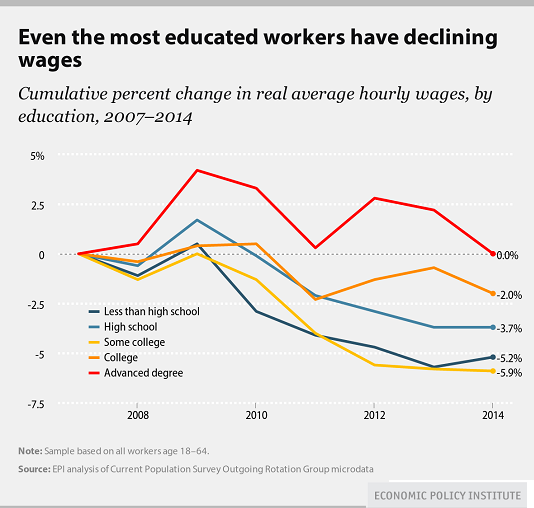Authored by Charles Hugh Smith via OfTwoMinds blog,
The answer is not another $1 trillion in student loan debt to pay for another raft of declining-value credentials.
So let's say we want to set up a system to help students choose a career that fits their aptitudes and interests. What would we do? How about:
1. Give them zero (or superficial) aptitude and career-related tests.
2. Provide a few minutes with a counselor who knows nothing about them, their aptitudes or potential career-related interests.
3. Design the high school education system to provide near-zero knowledge of finance, debt, economics, how the economy functions and what the world of work demands of workers.
4. Denigrate (subtly or directly) non-college career options, channeling those who aren't sure into 4-year colleges, higher education paid with student loans designed to maximize profiteering.
5. Force them to choose a major or field of study at 17 or 18 years of age, despite their lack of real-world experience and objective knowledge of how the economy functions and their own aptitudes/character traits.
6. Disconnect this higher education from real-world work places so they exit higher education with little actual knowledge of the skills employers need.
7. When the student graduates after borrowing a fortune and discovers their diploma has low value in the marketplace or is in a field they've found they loathe, then suggest the "solution" is to borrow another fortune and invest more years in obtaining another credential.
This is the American education-career maze–ineffective, self-defeating, wasteful, irrational, and apparently designed to maximize student confusion, poor choices and profiteering by higher education and the student-loan racketeers.
As if this wasn't bad enough, what do we decide to teach our students if careers might be significantly different in 10 or 20 years? Yes, math, the basics of science and communication skills will remain useful as a foundation, but these basics aren't enough to prepare students for a fast-changing emerging economy/4th Industrial Revolution.
Clearly, it would be enormously beneficial to teach the skills needed to learn on one's own and adapt successfully to changing circumstances. The current system is a hierarchy of credentialing that enriches those dispensing and funding the credentialing.
Our system's response to those left behind, those with inadequate skills and those who chose unwisely is always: get another credential, at enormous expense. Nobody tells students that credentials are in over-supply and are therefore losing their value.
Value and profits flow to what's scarce and in demand. Trying to reach the top of the credential pyramid is a crowded race, and the losers are left with debt and wasted years they could have spent actually learning useful knowledge bases and skills–in effect, pursuing a self-directed path of accrediting yourself.
The education-career maze doesn't have to be so self-defeating, costly, convoluted or ineffective. My book The Nearly Free University and the Emerging Economy lays out a model of higher education based on workplace apprenticeships in all fields, from carpentry to chemistry to sociology, from Day One, a structure that dramatically lowers costs while providing an education based on real-world acquisition and use of knowledge and skills in the workplace, not sitting in a chair watching a lecture.
Technology is a core part of improving results while lowering costs by 90%. Consider this article: Imagine how great universities could be without all those human teachers.
I describe the process of accrediting yourself in my book Get a Job, Build a Real Career and Defy a Bewildering Economy, which also details the eight essential skills needed to navigate the emerging economy.
What's the emerging economy/4th Industrial Revolution? It's not so much the replacement of human labor by robots as the augmentation of human skills with technology, and the focus on a simple but profound source of value creation: what's scarce and in high demand? What's abundant and not in demand?
The point of my book is to lay out a pathway of learning how to learn on our own and acquiring the soft skills needed to collaborate, communicate and manage teams/projects effectively, regardless of the field of endeavor.
How can we expect young students with little life experience to choose wisely when they don't even understand how the economy works? The current education-career maze assumes that some basic math and science knowledge is all students need to figure out their role in a fast-changing economy that they don't even understand.
The inadequacy of our crazy-making education-career maze boggles the mind. We need to do much, much better, not just for our students but for our society. The answer is not another $1 trillion in student loan debt to pay for another raft of declining-value credentials. We need a new system, and fast. Solutions abound, but not within the current crazy-making education-career maze.
Here's a snapshot of the workforce's education level:
Even the most credentialed workers' earnings have stagnated:

And here's your wunnerful federal government, enforcing debt-serfdom on college students to maximize the profits of the student-loan racket:
If you found value in this content, please join me in seeking solutions by becoming a $1/month patron of my work via patreon.com. Check out both of my new books, Inequality and the Collapse of Privilege ($3.95 Kindle, $8.95 print) and Why Our Status Quo Failed and Is Beyond Reform ($3.95 Kindle, $8.95 print, $5.95 audiobook) For more, please visit the OTM essentials website.
via http://ift.tt/2xwFRdQ Tyler Durden